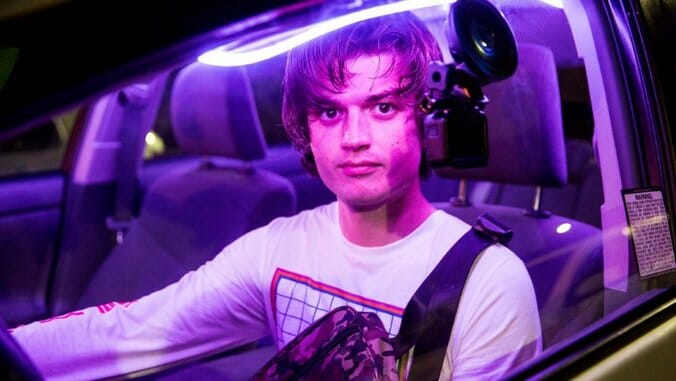The Protagonist of Spree Is Not So Much an Aberration as the End Product of a System Utterly without Value.
Photos via RLJE Films
A surface-level satire of America’s social media obsession might involve some poor, deluded soul carrying out a killing spree via Twitch or YouTube, gaining instant celebrity and slavish adoration from a legion of psychotic fans in the process. Eugene Kotlyarenko’s Spree, on the other hand, presents that scenario in a way that is more mundane but likely far more true to life—sad-sack rideshare driver Kurt (Joe Keery) starts bumping off his passengers in the pursuit of internet celebrity, only to find that the few people bothering to tune in still don’t give a shit about his crimes. Turns out that macabre “success” is still out of reach if you don’t have the winning personality and snappy catchphrases to match your unhinged bloodlust.
Spree is less an exercise in “ripped from the headlines” thriller, and more a cynical prediction of where society is headed. Its disdain for every facet of social media culture is intense and all-encompassing, and that invective carries the film through its 92-minute runtime. “Ripped from the dreadlines” might be the more accurate term, if you will, because the writers of Spree appear to be jaded and misanthropic enough that they seem to be expecting this sort of event to play out any day now. And honestly, who could blame them in 2020?
Keery is of course best known for his portrayal of Steve Harrington on Netflix’s Stranger Things, a pompadour-wearing high school cool guy who is drawn into a series of … well, strange things, that are being investigated by the town’s resident squad of plucky kids, Spielberg-style. Spree protagonist “Kurt Kunkle,” meanwhile, is perhaps what Steve might have grown up to be had he been born in 2000 rather than 1966; a guy who is so withdrawn from genuine human interaction and hopelessly embedded in a culture of online streamer celebrity worship that he’s long since forgotten any other form of entertainment or fulfillment. Keery has been dressed down here to the extreme—greasy, stringy, unkempt hair falling across his pox-riddled, sweaty face, he somehow manages to look younger and less capable than his Stranger Things self, but perhaps that’s just the utter lack of social maturity talking. He’s the kind of guy who, with no sarcasm, says things like, “If you’re not documenting yourself, it’s simple—you don’t exist.”
It almost goes without saying that Kurt fits the profile of most mass shooters, or white males who go on to perpetrate terrible acts, displaying every possible warning sign one might be able to display. He’s ignored by the world due to his social awkwardness and heart-breakingly pathetic quest for internet fame, but maintains a deluded sense of entitlement despite his years of failures. He has the manic irrepressibility of the inveterate gambler, always sure that his big breakthrough into overnight success is right around the corner. And so, he births a plan he egotistically names #TheLesson, in which he intends to casually kill his rideshare passengers while streaming, in order to win fame and praise from the sort of viewers who amuse themselves with videos pranking the homeless. The film invites you to make unearned comparisons to Scorsese protagonists like Travis Bickle and Rupert Pupkin in particular, but unlike those films, we never get a true understanding of why this quest is so important to Kurt.
The thing is, though, Spree isn’t only disgusted by Kurt, and that’s what makes it interesting. Many films, and god only knows how many episodes of Black Mirror (the best overall comparison for Spree, without a doubt) have hammered home the moral of social media’s artificiality and the mindless drones it turns people into, but never have I seen a story that feels so disgusted and resolutely angry about the issue as this one. Everyone in Spree seems to live the entirety of their lives online. Every rideshare patron Kurt picks up is as hopelessly lost in the minutia of Instagram or Facebook as he is, weighing their experiences solely by how the photos will play online. The more successful streamers he idolizes are viciously cruel, vapid black holes of personality who keep Kurt dangling on a string, promising to share some fraction of their power at an unknown future date. Even his father, played by an underused David Arquette, is hustling to get his own pathetic online presence off the ground, just like Kurt. One comes to realize that Kurt isn’t really that much of an aberration here; he’s just the end product of a system that is utterly without value.
-

-

-

-

-

-

-

-

-

-

-

-

-

-

-

-

-

-

-

-

-

-

-

-

-

-

-

-

-

-

-

-

-

-

-

-

-

-

-

-








































